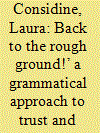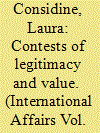| Srl | Item |
| 1 |
ID:
141218


|
|
|
|
|
| Summary/Abstract |
This paper asks what it is that we are doing when we talk about trust in international politics. It begins by reviewing the recent and growing body of research on trust and International Relations (IR). It claims that the existing literature is based on particular practices of representation that unquestioningly attempt to find the correct meaning for trust and that this representational account of meaning limits the form of the research, carrying assumptions about meaning that lead to several semantic and methodological problems. The paper challenges this way of understanding through the use of Ludwig Wittgenstein’s Philosophical Investigations and proposes an alternative, grammatical approach to trust and IR based on ‘meaning as use’. To illustrate this, the paper then conducts a grammatical investigation of the use of trust regarding nuclear arms control with the Soviet Union during the second term of the Reagan presidency. This challenges the familiar narrative of the role of trust at this time by going back to the ‘rough ground’ of President Reagan’s speech on trust and nuclear weapons.
|
|
|
|
|
|
|
|
|
|
|
|
|
|
|
|
| 2 |
ID:
168422


|
|
|
|
|
| Summary/Abstract |
The recently adopted Treaty on the Prohibition of Nuclear Weapons (TPNW) has caused much debate and controversy in global nuclear politics. Given that the stated goal of the TPNW supporters (states and NGOs alike) is to embed the treaty in the structures of nuclear governance and to strengthen its normative power, how likely is the TPNW to achieve these objectives? The article argues that the unique structures of legitimacy and value within which nuclear weapons are enmeshed place particular complications on the normative force of the TPNW as compared to previous humanitarian arms control initiatives, which has implications for the way in which the TPNW can function to consolidate a prohibitionary norm on nuclear weapons possession. The article uses the framing of legitimacy to analyse the complex structures within which the TPNW was adopted and within which it will enter into force, particularly focusing on the TPNW's relationship to the Treaty on the Non-Proliferation of Nuclear Weapons (NPT). The article concludes that consolidation may require a further challenge to the existing structures of nuclear order than state actors have, so far, been willing to make. This work is based on first-hand observations from the TPNW negotiations and interviews with civil society actors at the United Nations in New York in June and July 2017.
|
|
|
|
|
|
|
|
|
|
|
|
|
|
|
|
| 3 |
ID:
186990


|
|
|
|
|
| Summary/Abstract |
The past decade has seen a push for ‘gender sensitive’ approaches within nuclear policy-making. Yet the significance of this approach, and how it understands ‘gender sensitivity’ are unclear and have not been studied. This article asks the question: how does work done on ‘gendering’ nuclear policy to date understand what a gender sensitive approach to nuclear weapons means and requires? The article provides an overview of the movement to include gender in nuclear policymaking before conducting an analysis of the discourse on gender in a core institution of nuclear politics, the Nuclear Non-Proliferation Treaty (NPT). Through qualitative analysis of five years of NPT texts, we find that dominant understandings of a ‘gender sensitive approach’ centre on the inclusion of women. We further find that there is almost no mention of men and masculinity in the NPT discourse; women are constructed as a homogenous category of outsiders; and women's inclusion is understood mainly as a means of increasing institutional efficiency. We suggest that the next steps in ‘gendering’ nuclear policy engage more with feminist policy analysis and the experiences of those already working within the policy space, and consider further how and if one can meaningfully link gender sensitive approaches to the practice of nuclear deterrence. The findings of this study also have significance beyond nuclear weapons, illuminating the broader dynamics and challenges of ‘gendering’ international security spaces.
|
|
|
|
|
|
|
|
|
|
|
|
|
|
|
|
| 4 |
ID:
180346


|
|
|
|
|
| Summary/Abstract |
Trust between actors is vital to delivering positive health outcomes, while relationships of power determine health agendas, whose voices are heard and who benefits from global health initiatives. However, the relationship between trust and power has been neglected in the literatures on both international politics and global health. We examine this relationship through a study of relations between faith based organisations (FBO) and donors in Malawi and Zambia, drawing on 66 key informant interviews with actors central to delivering health care. From these two cases we develop an understanding of ‘trust as belonging’, which we define as the exercise of discretion accompanied by the expression of shared identities. Trust as belonging interacts with power in what we term the ‘power-trust cycle’, in which various forms of power undergird trust, and trust augments these forms of power. The power-trust cycle has a critical bearing on global health outcomes, affecting the space within which both local and international actors jockey to influence the ideologies that underpin global health, and the distribution of crucial resources. We illustrate how the power-trust cycle can work in both positive and negative ways to affect possible cooperation, with significant implications for collective responses to global health challenges.
|
|
|
|
|
|
|
|
|
|
|
|
|
|
|
|